- Home
- Allan Topol
Russian Resurgence Page 2
Russian Resurgence Read online
Page 2
In the café, he bought a turkey sandwich, a banana, and a bottle of water, paying with one of the hundred-dollar bills from the black case. The heavyset woman at the cash register raised her eyebrows, but didn’t say anything.
The café was otherwise deserted. Nick took the food over to a table across from a television tuned to CNN. He saw a blazing fire on the screen followed by smoldering ashes.
The announcer said, “This devastating fire occurred in a mansion on River Road in a tony area of Potomac, Maryland. According to neighbors, the house had three occupants: Peter Toth, his wife, Reka, and their twelve-year-old grandson, Nicholas. A Montgomery County police spokesman has stated the fire was so intense that the house was totally destroyed. The remains found were unidentifiable. All are presumed to be dead—burnt beyond recognition.”
As he listened, Nick began shaking. His teeth were chattering, and tears welled up in his eyes. “No,” he whispered to himself. “No.” It was so bizarre. He felt as if he were a character in a horror movie who was finding out about his own death on the news.
The announcer continued, “The cause of the fire is believed to be accidental, most likely started by the rupture of a gas line.”
As a picture of his grandfather flashed on the screen, Nick leaned forward to make sure he heard every word. The announcer continued, “Peter Toth, aged seventy, was born in Hungary. He became a prominent industrialist after Hungary achieved independence from Russia in 1989. Tragedy also struck this family a year ago when Peter Toth’s only child, Viktor, and Viktor’s wife, Ellina, were killed in a mysterious boating accident on the Chesapeake Bay. . . . Now let’s turn to financial news.”
Nick struggled against the blanket of grief and fear that threatened to overwhelm him. He was on the cusp of surrendering to it and the accompanying paralysis, but one factor pulled him back from the precipice—his grandfather’s words: “Be strong.”
Moscow
Fyodor Kuznov, the Russian president, sat in his palatial Kremlin office behind the ornate, gold-embroidered, red leather-topped desk—rumored to have been used by one of the czars—and looked at the television tuned to CNN. As he heard the announcer reporting on the fire in Maryland, a cruel smile crossed his face. He walked over to the map of Europe taped on the wall.
The map had been prepared in 1980, and it depicted the world as it was then: Russia in control of the USSR, and Russia dominating Central Europe (often described erroneously in the Western media as Eastern Europe) all the way west to Berlin and beyond. For Kuznov, the events of the late 1980s and early 90s when the Soviet Union collapsed were a self-inflicted tragedy. The Berlin wall came down, and Moscow lost its control of Central Europe.
At the time Kuznov had been a mid-level official with the KGB working with the Russian army to put down the violent revolution launched by Chechnya to join the exodus from Russian rule. Kuznov believed the best way to kill a snake was to cut off its head. Thanks in large part to Kuznov’s ruthlessness in destroying the Chechen leaders, Russia smashed the revolution, laying waste to much of the capital of Grozny in the process.
Following the war, Kuznov returned to Moscow expecting a hero’s welcome, but the country’s leadership didn’t care. They were concerned with the dismantling of the Soviet Union and the creation of democracy in Russia. Kuznov had thought it was a farce—democracy could no more take root in Russia than roses could grow in an oil field.
For Kuznov, the dismemberment of the Soviet Union was a travesty, neither inevitable nor compelled by the force of events. Rather, in Kuznov’s view, this horrendous outcome could be attributed to a lack of effective leadership in the Kremlin. Even the spineless Gorbachev, who became along with his wife, Raisa, the darling of the Western press, conceded that the Soviet Union could and should have been preserved. Yeltsin, who followed him, was a drunk and plunged the country into economic chaos. He couldn’t lead a class of school children to the bathroom, even on one of those rare days when he was sober. Had Stalin, Khrushchev, or Kuznov been in power, the map of Europe would now look exactly as it had in 1980.
Some leaders would whine and bemoan what had happened to their nations. Not Kuznov. The Russian leader didn’t believe in wasting time crying over spilled milk. Instead, he wanted to find a way to refill the bottle.
To achieve that ambitious goal, Kuznov decided to utilize the democracy he despised in order to catapult himself from KGB apparatchik to national leader. He grabbed on to the coattails of Ivan Samoren, the then mayor of Moscow, rising from Ivan’s director of security to deputy mayor. With Kuznov’s KGB training, it was easy to arrange Ivan’s death by poisoning without leaving any evidence that might point back to him. As Ivan’s deputy, Kuznov was a natural choice to succeed his hapless benefactor, whose wife, Catherine, was in Kuznov’s bed the night her husband died. When he tired of Catherine a year later, he dispatched her on a one-way trip to the gulag.
One of the things Kuznov had learned from Ivan was that it was possible to fix elections in Russia. By the time Kuznov ran for president, after being Moscow’s mayor for five years, he had assembled a coterie of oligarchs whose wealth had been acquired by stealing assets from the state during the shift from Communism to a market economy. Those oligarchs financed his election campaign, and former KGB colleagues supplied the muscle to destroy opponents. With that combination, Kuznov sailed into the presidency.
Once he had secured his position, he focused on his burning desire to rebuild the Soviet Empire and develop enough power to pose a threat to Germany, France, and even the United States. In the first stage of his program, he rebuilt and strengthened the Russian military, aided by an alliance with Beijing, which supplied military technology to Russia in return for Moscow constructing a pipeline to transport badly needed oil and gas to China.
Now Kuznov was ready for the second stage. He raised his hand and placed a finger on Hungary. Hungary was the key. The secret agreement he had reached with Hungarian Prime Minister Szabo, referred to as the Friendship Pact, was to be announced in a little over two weeks at a public ceremony in Budapest. This pact would go a long way toward enabling Russia to regain control over Central Europe, since it would permit Russia to station its troops and military equipment in Hungary.
In Szabo, Kuznov found an unlikely but willing ally. Franz Szabo had been a left-leaning socialist when he became prime minister of Hungary fifteen years ago. Like Kuznov, Szabo was a totally amoral leader. While he might have started out with political convictions, wanting to improve the lives of the Hungarian people, the longer he remained in office, the more he was driven by a desire to solidify and to tighten his hold on power while expanding his personal prerogatives.
Recognizing that his primary opposition was coming from the right, Szabo moved in that direction to commandeer the support of his right-wing opponents. He became indifferent to the left. They had nowhere to go. And there was something else driving Szabo that Kuznov could exploit: The Hungarian leader despised the German chancellor. Szabo was convinced she was trying to establish German hegemony over the entire continent. He was unwilling to let Hungary become a vassal state in the new Teutonic empire.
Once Kuznov realized what was motivating Szabo, the Russian leader reached out to his Hungarian counterpart with an invitation to that year’s Defender of the Fatherland Day celebration. Watching in a position of honor close to Kuznov in the reviewing stand, Szabo was dazzled by the Russian show of military force. Kuznov invited him to a celebratory dinner that night and arranged for two voluptuous women to visit Szabo in his hotel room. At breakfast the next morning, Kuznov opened discussions with Szabo about the Friendship Pact. The Hungarian had dragged his feet, appearing reluctant to enter into the agreement during the endless rounds of negotiation with Dimitri, Kuznov’s trusted aide.
Finally, three weeks earlier, Szabo flew to Moscow and they shook hands on the deal, which was to be publicly announced on August 16 at a signing ceremony in Budapest. Its most critical provisions were that Russia would exp
and the nuclear power plant it had built for Hungary during the Communist period and construct a second nuclear plant. The two combined would supply virtually all the electricity Hungary needed, freeing them from dependence on oil and gas imports. In return, Russia would be allowed to station its troops and military equipment in Hungary.
Looking at the map, Kuznov moved his finger east and then north from Budapest. With Hungary as a jumping off point, Russia could take over the Czech Republic and Poland. In the meantime, other troops would roll west from Russia, conquering Ukraine and Romania, later joining up with the troops advancing from Hungary.
Kuznov was not concerned that he would meet resistance from France, Germany, or England. He viewed their leaders as weak and spineless. If you pushed against them, they gave way. In the case of Germany, as long as Kuznov signaled that he would not cross their border, they would look the other way. All they cared about was expanding their economy—they wouldn’t want to get involved in anything this messy. Moreover, making his move with Hungary right now in August was a stroke of genius. The Western Europeans never liked to do anything that interfered with their prized August vacations.
As for US President Worth, Kuznov was strongly of the view that the people in Congress, exhausted from wars in the Middle East, would never countenance involvement in a European war until it was too late—until Kuznov had a tight grip over Central Europe. It would be déjà vu, the 1930s all over again in terms of Washington overlooking unpleasant realities in Europe and hoping it would all blow over. His plan had been brilliantly developed. Once his agreement with Hungary was announced, Kuznov could begin implementation.
Everything had been proceeding smoothly until ten days ago when an upset Szabo had called Kuznov to say they had a problem. Peter Toth, who had been a powerful Hungarian industrialist and was now living in the United States, had somehow learned about the secret agreement between Kuznov and Szabo. Now Toth, aided by Emma Miller, his former CFO, was threatening to torpedo the agreement. In that phone call Kuznov had assured Szabo not to worry. “Nobody, and I mean nobody will stop this agreement from going into effect,” he had said.
Kuznov turned back to the map. He looked at the Russian border with Ukraine. He would airlift Russian troops and supplies over Ukraine and into Hungary. Ukraine wouldn’t dare to try and stop them.
Kuznov heard his intercom buzz. Then the sound of his secretary’s voice came, informing him that his aide, Dimitri, had arrived.
“Send him in,” Kuznov said.
The Russian president moved from the map to his desk.
Dimitri, a tall, thin man in his thirties with hollow cheeks and sunken eyes, was the son of one of the generals Kuznov had worked with in Chechnya. He had a brilliant mind and had studied political science at the University of Moscow. What Kuznov most appreciated was Dimitri’s loyalty and his desire to complete every assignment Kuznov gave him successfully.
As soon as he saw Dimitri, Kuznov was struck by the worried expression on his face. Before Dimitri had a chance to speak, Kuznov said, “I heard on CNN about the fire at Peter Toth’s house. Were our men able to learn anything before killing Peter and the others?”
Dimitri shook his head. “If they had, they were instructed to go immediately to our embassy and to communicate with me. I haven’t heard anything so the answer must be no. Judging from all the reports in the American media and the statements by the local police, it is clear that Peter Toth, his wife, Reka, and grandson, Nicholas, are all dead.”
“Dammit,” said Kuznov, frustrated they hadn’t learned anything about what plans Toth may have set in motion. But there was still hope, he remembered. “What about the woman in Paris?”
“Everything is proceeding on schedule.”
Kuznov narrowed his eyes at Dimitri. “What else? Why do you look worried?”
“I just returned from Budapest where I was making arrangements for the Friendship Pact signing ceremony. During a private meeting with Prime Minister Szabo I was suggesting that we should have it in front of their parliament building when suddenly, without any warning, Szabo said, ‘The agreement is off. I won’t sign it.’”
Kuznov was flabbergasted. “What?”
The Friendship Pact was the linchpin of his entire European initiative. Enraged, he pounded his fist on the desk and shot to his feet. “Fucking Hungarian! I want you to have him killed. Make it look like an accident.”
Dimitri shook his head.
“You’re daring to disagree with me?” Kuznov hissed.
Dimitri cowered in the chair. “Not disagreeing, Mr. President. With all due respect, I merely want to raise a point for your consideration.”
“Okay. I’m listening.”
“Szabo’s deputy and likely successor if anything happens to him has developed a very close relationship with the German chancellor and the French president. He wants better relations with the West and will never even for one moment consider the Friendship Pact.”
“How do you know this?” Kuznov asked.
“He explained it to me in a private conversation. He wanted me to know that he disagreed with what Szabo was doing. He also said that the justice minister, Janos Rajk, disagrees as well.”
“Suppose you were to tell Szabo’s deputy why Szabo was murdered.”
“He would leak it to the press,” said Dimitri.
“So you’re telling me we’re finished in Hungary. That means my entire plan to rebuild the Russian empire collapses.”
“No, sir. Not at all.”
Kuznov was mystified. “What, then?”
“In my opinion, Szabo is behaving like a rug merchant. He wants a better deal.”
“We’ve agreed to construct enough nuclear energy facilities to supply virtually all of Hungary’s electricity. I won’t do any more.”
“I think he’s looking for a personal payoff.”
“What do you base that on?”
“He said that he won’t be gaining enough from the agreement, and that with the opposition Toth has stirred up, he’ll be facing too many risks. I reminded him that in addition to the nuclear energy facilities, he will be striking a blow against the Western Europeans, who he hates.”
“And?”
“He repeated, ‘I gain nothing from the agreement.’”
Kuznov pondered Dimitri’s words.
“What do you want me to do?” Dimitri asked.
Before responding, Kuznov thought about the systemic corruption in Russia. He was convinced that practically every top official in his government had stolen money from the State and stashed it in foreign banks. Kuznov himself had numbered accounts in three banks—one in Switzerland, one in Andorra, and one in Panama. He could hardly be upset at Szabo for trying to line his own pockets. In this respect, why should Hungarians be any different from Russians? Or leaders in just about every country in the world?
Besides, the Russian had three favorite ways of dealing with his opponents: arrest them, kill them, or bribe them.
“Return to Budapest,” Kuznov said. “Offer Szabo 100 million euros to be deposited in the bank of his choice if he will agree to sign the Friendship Pact.”
“That might work,” Dimitri conceded.
“Not might. It has to work. This is critical for me, so that means it’s critical for you.”
The unstated threat hung in the air.
Paris
The sun was struggling to break through thick gray clouds in the eastern sky on what was predicted to be a cool but dry day, more like fall than summer. For Craig Page, this was perfect weather for a morning run.
Craig had a regular routine. He normally left the still sleeping Elizabeth Crowder in bed at their apartment, which was on the left bank close to Boulevard Saint-Germain, not far from Saint-Sulpice. He then crossed the Pont Royal, continued past the Louvre around the Jardin du Carrousel, and turned around and ran to Place de la Concorde, where he crossed the river. Then down to the Quai Anatole-France along the Seine.
That morning the fir
st part of his routine was shattered. While he was looking for his running shoes, Elizabeth’s cell phone began to ring. He looked at her anxiously as she sat up in bed, reached over to the nightstand, and grabbed the phone.
“Yes,” she said. “Yes. Give me that address again. . . . Okay. . . . Got it. I’ll be right there.”
She put down the phone and jumped out of bed.
“What happened?” Craig asked.
“It was Henri. A woman was murdered in a house on Place des Vosges. He wants me to go there and cover the story.”
“Why you? You’re the foreign news editor, not some damn police reporter.”
“Henri says it has an international component. The woman was a Hungarian national and a big deal with a Swiss investment bank.”
“Oh bullshit, all of his police reporters are probably off on August holiday.”
She came over, kissed him, and said, “Now, now. No grumbling. Henri rotates the August assignments and this is my year. Besides, you have next month’s car race to prepare for. And after that, we’re going deep sea diving off Australia. It’s not a tough life.”
He wrapped his arms around her. “It would be easy to placate me and it wouldn’t take long,” he murmured.
“Down boy,” she laughed, slipping away and heading into the bathroom where she turned on the shower.
Craig went into the kitchen, returning moments later with two cups of double espresso. While Elizabeth dried her hair, he placed one on the sink nearby.
“Thanks,” she said.
“As long as one of us has to work, I’m glad it’s you,” Craig quipped.
She put down the hair dryer and picked up the espresso. “Very funny. If I had received a five-million-euro bequest from my benefactor I wouldn’t be working either.”

 Conspiracy
Conspiracy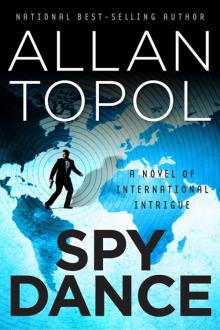 Spy Dance
Spy Dance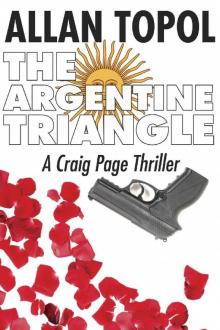 The Argentine Triangle: A Craig Page Thriller
The Argentine Triangle: A Craig Page Thriller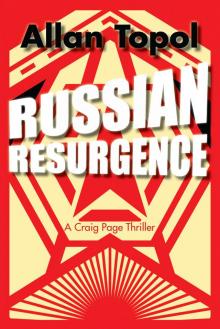 Russian Resurgence
Russian Resurgence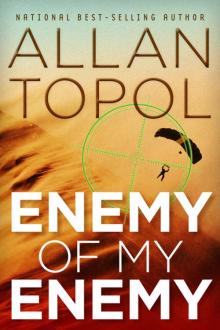 Enemy of My Enemy
Enemy of My Enemy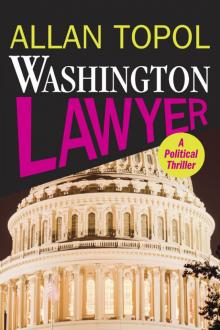 The Washington Lawyer
The Washington Lawyer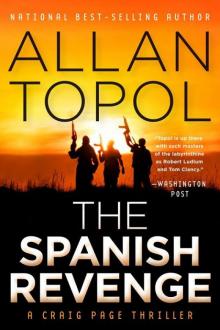 THE SPANISH REVENGE (Craig Page series)
THE SPANISH REVENGE (Craig Page series)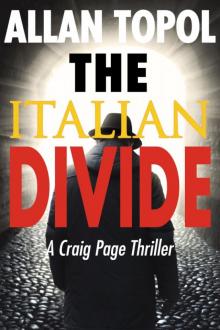 The Italian Divide
The Italian Divide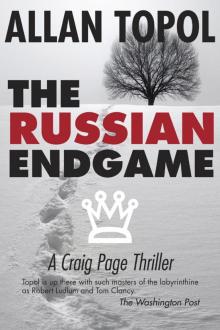 The Russian Endgame
The Russian Endgame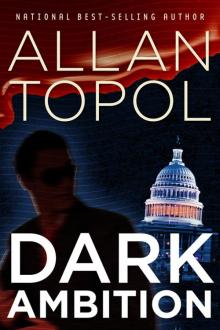 Dark Ambition
Dark Ambition